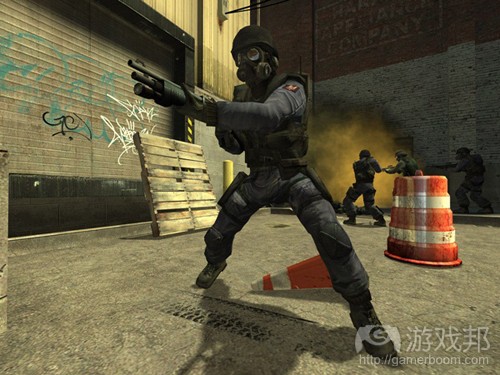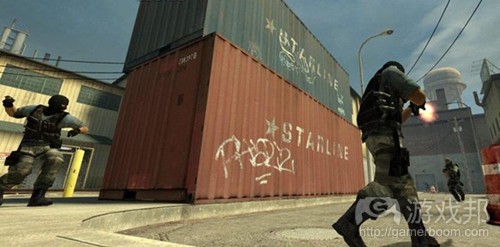建立玩家情感联系 《反恐精英》更具社交性
作者:Mike Rose
社交游戏?这个标题应该能吸引大部分人的眼球,因为《反恐精英》(以下简称为CS)中实在是缺少称得上是“社交”的元素。确实,“社交”在当前电子游戏中通常等同于“用请求偷窥和访问你的Facebook好友装扮的虚拟空间。”
除了任天堂和偶尔的音乐或跳舞游戏还在努力之外,老一代“社交”电子游戏已经在网络时代灭绝了。围坐在小电视前,对着《马里奥赛车》兴奋地喊着“该死的蓝壳”,或者怒视着在《黄金眼》中玩Oddjob的人,这些都是过去的日子了。
然而,在电子游戏中仍然有很多进行社交活动的方式。大型多人游戏使我们能够组成团队一起做任务;结束了白天的辛苦工作后,我们渴望和朋友一起在射击游戏中合作、在战略游戏中竞争,以此打发掉漫漫长夜。
如果我告诉你我最喜欢的社交游戏是什么,你大约会认为我在开玩笑吧。但说实话,这款游戏带给我绝大部分社交体验——其中很多体验使我的人生受益匪浅,这款游戏就是CS系列。
CS首发于2000年,刚开始时与《半条命》模式一样。这是一款第一人称策略射击游戏,该游戏公认地很难以上手。在真正上手以前,新玩家会死很多很多次,因为游戏有相当高的精度要求。
CS的版本很多,如《零点行动》和我个人最喜欢的《起源》(以下简称CSS),但个版本都遵循相同的基本规则,只是修订了画面、增加了额外的设定和地图等。
我之所以开始玩这款游戏,是想融入室友的社交圈中。我的两名大学室友隔天晚上都要打CS,我可以听到他们的谈话,知道他们玩得很开心。而我却错失了什么,我想加入他们。
正是玩CS的方式促成了社交活动。当玩家死亡后,就不能再做任何事,直到下一回合开始。等待下一回合听起来大约不算什么了不起的体验,而事实上,这段等待时间却构成了CS之所以是社交游戏的核心。
在这段时间内,玩家们可以互相交谈,可以是文本的也可以是语音的。你可能会以为大家会趁机骂脏话、滥发邮件和发脾气,但真实情况恰恰相反。CS圈中的默认文化使绝大多数玩家彼此交流的方式——我敢说,是非常友好的,无论是竞技的对话,还是善意的玩笑。
玩家还可以在这段时间内评论别人的活动,因为游戏中有摄像机,玩家可以切换到活着的玩家那里。看到惊人的技巧、超强的运气或愚蠢的举动,死掉的玩家会聚在一起,为不良后果或扼腕叹息,或谈笑风生。
为什么CS仍然是Steam平台上玩家最多(目前玩CS和CSS系列的玩家人数比其他任何游戏都多)的游戏呢?主要原因之一是这些社交互动元素。当然,游戏本身是很好的,如果不是这些社交元素,毫无疑问,它老早就被忘到九霄云外去了。
这也是我会在这款游戏中投入大量时间的主要原因,与它相伴的日子将我与其他人联系在一起。通过游戏,我结交了真正的朋友,提高了现实生活中的技能,甚至我的写作生涯也结缘于这款游戏。
在我的大学时代,我和一个朋友打算建立一个CSS的“家族”,给我们的名字穿上统一“马甲”,好将我们自己与其他人区别开来。之后我们加入了多个CSS公会,希望能出名,挤上服务器的排行榜,至少使别人注意到我们玩着这么一款好游戏。
正是在公会中,CS的社交活动热闹起来。许多玩家会搜索他们的服务器列表,一个接一个地试服务器,直到找到适合他们的。之后他们会长期驻扎在这个服务器中,数周、数月甚至数年,如果这个服务器的玩家仍然很多的话。
当你成为公会的一分子,你就很难放弃那种联系了。所有人都“认识人”其他人。因为在游戏会公告“玩家XXX加入本服”时,文字聊天就开始出现玩家期待他们了解的竞争者加入这样的信息。当有人占据食物链的最顶端,一个公会传说就诞生了。在其他玩家的眼中,你确实有可能成某类英雄。
之后你开始看到,当公会成员挂掉后,他们就开始讨论自己的现实生活。大家开始真正地关心彼此,谁谁谁来自哪里、靠什么谋生等等。公会最伟大的一方面是文化多样性——你很难相信来自世界各地的人可以如此轻松地欢声笑语、相互陪伴。
但这只是CS故事的一半,是大多数玩家看到的那一半。而另一半只有那些深入钻研过CS的竞技部分(战争、混合和联盟)的人才能看到。成为“公众英雄”是很好,但如果你没有玩过五对五的竞技,你就没有真正体验到CS的完整社交体系。
在CS中玩竞技与玩公共服务器游戏非常像,规则和前提是类似的,但真实情况远不止如此。当在一个五人小队中游戏时,你必须互相理解、彼此尊重到可笑的地步,如果你想继续玩下去的话。
我的家族中有英国人、德国人、波兰人、荷兰人和许多欧洲国家的人。所有人都讲英语,所有人都尊重各自的文化、差异和习惯。用感人一点的词来说就是,我们是一家人。我们知道谁能做什么,我们尊重每个人的能力。
在我和队友一起游戏的日子里,我学到了人生中重要的两课。第一课是,我们组成了一个公会,我们成了他人要打败的对象,以及能够共度美好时光的玩伴。我喜欢这么想,正是因为和这些人一起游戏,我在现实生活中才变得更加友好,才学到了真正的社交技能。
这些社交互动最终促成了我现在的职业。我所在的公会是一个公司的小团队,我最终开始给公司撰写专栏和文章,只是因为老板看到我在游戏中表现出来的好口才和好个性。如果不是因为玩CSS,我心想我今天肯定成不了写手。
从玩CS的日子中我学到的另一课,也是让我感到自豪的是,我成了一个能让别人生活得更好的人。在打CS的那些年,我还很年轻,在我们的家族中还有更年轻的成员,他们那时还在上学。
当我们第一次交谈时,他们的英语不算太好,但不影响我们一起玩游戏。两三年以后,他们的英语有了可观的进步。几个月以前,他们当中的某人给我发了一条Facebook信息,内容如下:
“亲爱的Michael:
我想谢谢你教我英语。我在考试中得了A,跟我们班上以英语为母语的人分数一样,多亏有你。你真了不起,我也是哦。”
这就是我和他和电子游戏的时光——一段浪费掉的时光,我们应该用来看书的,是吧?
正如我所说的,当前的社交游戏完全不社交,特别是与某些你可能不会立即想到是社交的体验相比。《Counter Strike: Global Offensive》发行在即,新系列将使休闲玩家更容易上手,相信有兴趣的玩家仍然有很多机会进入真正的社交游戏空间。(本文为游戏邦/gamerboom.com编译,拒绝任何不保留版权的转载,如需转载请联系:游戏邦)
Opinion: Counter Strike – A true social game
by Mike Rose
Social games, eh? The irony of the name isn’t lost on the majority of us, given the incredible lack of anything social. Indeed, “social” in video games now usually equates to “bugging your Facebook friends with requests and visiting a virtual area that they customized in some way.”
Aside from Nintendo’s efforts and the occasional music or dance game, the “social” video games of old have all but died out thanks to the age of the internet. Sitting around a tiny television and shouting about “that damn blue shell” in Mario Kart or throwing glares at the person who chose to play as Oddjob in Goldeneye is but a thing of the past.
And yet there are still plenty of ways to be social in video games, even if it is all conducted through cables and waves. MMOs are allowing us to form teams and go on quests together, while co-operative shooters and competitive strategy games can be evening events with friends that we look forward to after a hard day at work.
You’d probably think I was joking if I told you my favorite social game. But quite honestly, the games which have provided me with the most incredible social experiences — numerous of which have actually benefited by life immensely — is the Counter Strike series.
Shoot first, laugh about it later
Counter Strike originally launched in 2000, having previously started life as a Half-Life mod. It’s a first-person tactical shooter which, admittedly, can be tricky to get into, given its unforgiving nature. Newcomers to the title can expect to die many, many times over before they really get into it, thanks to the precision required and the rather quick deaths.
There are various versions of Counter Strike available, including Condition Zero and my personal favorite Source, but each iteration follows the same basic principles, albeit it with revamped visuals and extra features and maps here and there.
I started played the game as a result of wanting to be part of a social happening. My two housemates at university were playing it every other evening, and I could hear them talking to each other and enjoying themselves. I was missing out on something, and I wanted in.
The way in which a game of Counter Strike plays out is what leads to a sudden influx of social activity. When a player dies, they are out and cannot do anything until the next round begins. Sitting around and waiting to play again may not sound like the greatest experience, but in fact this waiting period makes the core of why CS works.
During this time, players can talk to each other, either via text chat or voice chat. You’d think this would result in an influx of profanity, spam and general irritation, but in fact it’s quite the opposite. There’s this unspoken culture built into CS which causes the majority of players to interact with each other in a — dare I say it — friendly way, be it through competitive talk or simply public banter.
This period also allows players to comment on the ongoing action, as the game gives access to the camera, giving you the opportunity to switch through the alive players. Witnessing moments of incredible skill, luck or stupidity work to bring the deceased players together, lamenting handiwork and joking around in a group.
One of the main reasons why the Counter Strike series is still the most played game on Steam (the number of people currently playing Counter Strike and Counter Strike: Source together is more than any other game) is these social interactions. Sure, the game itself is glorious, but without these social elements, it would no doubt have been forgotten long ago.
It’s also the main reason why I personally have put thousands of hours into the titles, and have hundreds of stories that brought me together with other people. I’ve made real friends through the game, built up real-world skills, and even started my writing career through it.
Back in my university years, a friend and I decided to start a Counter Strike: Source “clan,” donning a “tag” on our names and pitching ourselves as a cut above the rest. We then joined multiple CSS communities in the hope of making a name for ourselves, topping the leaderboards on servers and generally making sure we played such a good game that other players would take note.
Communities are where the social elements of Counter Strike really thrive. A lot of players will scout through their server list, trying out server after server until they find one which suits them. They’ll then stick with that server for weeks, months, maybe even years if it continues to thrive with players.
Once you’re part of a community, it’s difficult to let go of that connection. Everybody begins to “know” everybody else. As the game exclaims “Player X has joined the server,” text chat begins to fill with people anticipating the injection of another competitor whose gameplan they know well. Community legends are born based on who is top of the food chain. You really can become some sort of hero in the eyes of other players.
And then you begin to see community members discussing what they’re up to in real-life whenever they are killed. People begin to actually care about each other, where each other is from, what they do for a living. The greatest part of it all is how multicultural it is — you’d be hard-pressed to find another place in which people from all over the world can laugh together so easily and enjoy each others’ company.
Close-knit
But this is only one half of the Counter Strike story, and the half that the majority of players see. Those who delve deeper find the competitive side of CS — the wars, the mixes, the leagues. Being a “public hero” is all well and good, but you really haven’t experienced CS’s full social package until you’ve played some five on five.
Playing competitively in CS may appear to be very much the same as a public server game, with similar rules and premise, but this couldn’t be further from the truth. When playing in a unit of five, you need to understand each other and respect each other to a ridiculous degree if you’re going to go anywhere with it.
My clan featured British players, Germans, Poles, Dutches, and a whole host of other European nationalities. Everyone spoke English, yet everyone respected each others’ cultures, nuances and oddities. It was, to put it in a very mushy way, a sort of family. We knew who could do what, and we respected each person’s abilities.
I took away two key life lessons from my time playing with my teammates. The first was our integration into a community, where we became known as the people to beat, but also the people to have good times with. I like to think that I actually become a friendlier person in real life and learned real-life social skills while playing with these people.
The end result of these social interactions was my current career. The community I played a part of was a smaller entity in a bigger group, and I was eventually asked to write columns and articles for the company, simply due to my showing the owners that I was articulate and friendly during play. If it wasn’t for playing Counter Strike: Source, there is no doubt in my mind that I wouldn’t be a writer today.
The other element that I am proud to take away from my time with CS is how much I ended up playing a role in bettering other people’s lives too. I was still young during my CS years, and we had a number of even younger players in our clan who were still at school.
When we first began talking, their English wasn’t incredible, but it was enough that we could enjoy playing together. A couple of years later, and their English had improved phenomenally. I received the following Facebook message from one of them just a couple of months ago:
“Dear Michael,
I want to thank you for the English lessons you gave me. I got an A in my A Level, same score as an English native speaker in my class and that’s because of you. You are awesome, so am I.”
That’s from my time and his time with a video game — one of those time-wasters that we should really be putting down in favor of a book, right?
So like I say — social games really aren’t social at all, especially compared to some of the experiences you might not immediately think of as particularly social. With the upcoming release of Counter Strike: Global Offensive, which is looking to make the series more easily accessible for the casual gamer, there is still plenty of opportunity for interested game players to get involved in the real social gaming space. (source:gamasutra)









































 闽公网安备35020302001549号
闽公网安备35020302001549号